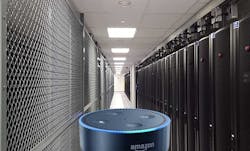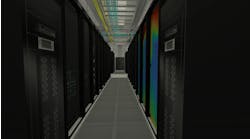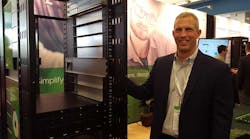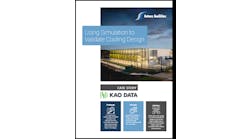Here’s a scenario for you: It’s morning and you walk into your data center and there’s a note from the previous day from your DevOps team. They’re asking you to spin up a few AWS instances so they can test out some new code. You’ve got AWS Direct Connect setup, so you know you have a clear link into your AWS cloud ecosystem.
Then, you simply walk up to your Amazon Echo voice assistant and say, “Alexa, spin up 5 VMs in the DevOps cluster.” Alexa responds with her usual “OK,” your DCIM architecture gets updated with new usage metrics, and you continue about your day knowing this task was done.
Far-fetched? Or is this just around the corner?
In a data-driven society, cognitive systems have become the pivot point for digital transformation efforts. IDC recently pointed out that the flood of data enables a new set of technologies such as machine learning, natural language processing, and artificial intelligence — collectively known as cognitive systems — to turn data analysis from an uncommon and retrospective practice into a proactive driver of strategic decision and action.
Cognitive systems can greatly step up the frequency, flexibility, and immediacy of data analysis across a range of industries, circumstances, and applications. IDC estimates that the amount of the global datasphere subject to data analysis will grow by a factor of 50 to 5.2 zettabytes in 2025; the amount of analyzed data that is “touched” by cognitive systems will grow by a factor of 100 to 1.4 zettabytes in 2025.
The data center has always been a focal point for automation that can allow IT teams to do more with less, seeking to amplify the amount of work that can be managed by each team member. As the volume of data flowing through these facilities continues to grow, the industry will continue to look for new ways to wrangle all this data and equipment.
The Emergence of VoiceOps
When it comes to data center operations, cloud, and even working with the business, there are some really cool new trends emerging. Leveraging VoiceOps (or ChatOps) allows you to do some pretty amazing things with your voice-powered assistant.
There’s already a line of business for this. Amazon is already offering Alexa for Business, which uses information about the devices, user accounts, and skills in your organization. When someone in your organization asks Alexa a question, Alexa uses this information to respond or perform the requested action. For example, when a user says “Alexa, start the meeting” in a conference room, Alexa uses the location of the device, the calendar information for the room, and the type of video conferencing equipment available, all stored in your Alexa for Business account, to start the meeting.
Here’s how it works:
[Source: Amazon]
Already, there’s a lot you can do when it comes to operating a business. For example, you can ask Alexa to do the following:
- “Alexa, start the meeting.”
- “Alexa, is the room free at 4?”
- “Alexa, lower the blinds.”
- “Alexa, call a shuttle to building 1.”
- “Alexa, find an open conference room.”
The list goes on for general business functions as well as functions for enrolled users.
And so, the next big question – why not IT and the data center?
In the latest AFCOM State of the Data Center study, we asked what data center leaders were doing when it came to leveraging new and innovative solutions. Remember, these solutions are aimed at improving data center efficiency while still delivering new capabilities to the customer. We found four solutions are leading the charge with Data Analytics and Big Data as the top two. In fact, 52% of respondents indicated that they’re already leveraging data analytics and another 42% said they’re already using big data.
We know that leveraging data and even machine learning is top of mind for innovative data center leaders. I got the chance to actually ask this very question during a recent conference.
I recently was the Instructor for the AFCOM Leaders Lab in Dallas. Our focus for the day revolved around data center management, operations, DCIM, and future concepts. Towards the end of the lab, I asked our 20-plus participants what they thought the future of data center management looked like. Unprompted to what responses should be, here’s what they came back with:
- The ability to delivery proactive operations, management, and data center control.
- Multiple IT and infrastructure subsystems integrated.
- Integrated data modeling used for prediction, service management, multiple views, and optimizing in real-time.
- Self-optimizing, autonomic data center management.
- Voice-powered and/or voice-controlled data center management with direct DCIM integration.
I asked the group to go into further detail around this DCIM-integrated, voice-powered assistant, and each group stated that they absolutely see this in the near future. They mentioned that they’re already seeing smarter DCIM systems which help you predict usage. They’re already seeing smarter rack systems which give you granular details around the data center including things like component elevation, vibration metrics, biometric access data, and so much more. Using voice-powered controls, to the group, almost seemed like the logical next step.
Real-World Examples
So let’s go back to our initial example of spinning up a DevOps cluster. In a video posted by the AWS Michigan Meetup group, we were able to actually see how Alexa, using invocation, was able to control AWS deployments, re-deploy a given workload from one AWS region to another, and even request a company’s current AWS bill.
Even now, Alexa for business has a lot of ways you can develop your own skills. Amazon points out that Alexa for Business offers additional APIs, which you can use to add context to your skills and automate administrative tasks. For example, the ResolveRoom API provides device location information which can be used to give Alexa additional context and improve the voice interaction for the user. The Alexa for Business console API allows you to integrate Alexa for Business into your existing tools, automate administrative tasks, or build your own portals for tasks like user enrollment.
Citrix has already announced plans to offer Alexa for Business to manage software and platforms. A key question will be whether these solutions will meet the security requirements for enterprise customers, including data center operators. That includes the question of what is being recorded when the Echo is in listening mode (AWS has an FAQ on this topic).
So, is this function around the corner? Quite possibly. If you’re a DCIM manufacturer and you’re reading this, VoiceOps “Command and Control” functions for the data center might be the next big thing. Integration with the DCIM software can offer some really powerful voice-powered controls and information relaying. How cool would it be to simply say, “Alexa, reduce fan speed in row 12 to 70%.” Or, “Alexa, what is the PDU load in rack 8?”
We know the business is heading in this direction. Since the data center and IT power the business, it only makes sense that we consider bringing some of these efficiencies into our data center environments.






